Another week, another dead cat thrown on the table by the Remain leader David Cameron. Antibiotic resistance is a major threat to public health but hardly a new one.
It’s been urgent for at least 20 years, and the first cases of MRSA in the UK date back to the 1960s. The only urgency about this at the current G7 summit is that it makes it look like Dave’s doing something.
He needn’t have bothered. If he really wants to cut the risk of drug resistant bugs rotting us from the inside out he needs to take an evidence based approach by leaving the EU.
The EU is dominated by agribusiness sucking up subsidies and shovelling antibiotics down our chicken, pigs and cows. Our abattoirs have been closed by EU directives, and laws on drug control are easily flouted by big corporations.
Norway, however, has done things the right way. It limits the free movement of livestock — huh hmm — and works very hard to cut antibiotic use. It also controls the human food chain. You won’t find Romanian donkey mince in Norway’s meatballs, and you won’t be shipping much live cattle through its ports either as it limits this — and this limits the spread of drug resistant bugs.
A report by the European Medicine Agency published back in 2014 showed Norway and Iceland, EFTA counties trading freely with the EU, had among the lowest rates of antibiotic use in Europe. Drug resistance comes from using antibiotics in livestock that are similar to use those used in humans. It also has the lowest rates of MRSA and other drug resistant infections in patients with sepsis. Bulgaria, on the other hand, has one of the highest drug resistance rates.
Cypriot farmers come at the bottom of the list, using 408 mg antibiotics per kg of meat, a little more than Italian (370 mg/kg), Spanish (249 mg/kg) and German farmers (211 mg/kg). Among European countries, Norwegian and Icelandic farmers (3.7 mg and 6.3 mg per kg, respectively) come on top as those who use the fewest antibiotics in food production.
It doesn’t take a genius to work out how we stop the spread of drug resistance from livestock. We have to limit the spread of live animals between Europe and the UK and adopt our own very tough standards to stop dodgy companies pouring drugs down our chickens’ gizzards. The jury’s been back for a while now and the verdict is clear.
To cut the rate and spread of drug resistant bacteria getting into the human population we must leave the EU, and go for a Norway type approach to infection control.

COMMENTS
Please let us know if you're having issues with commenting.